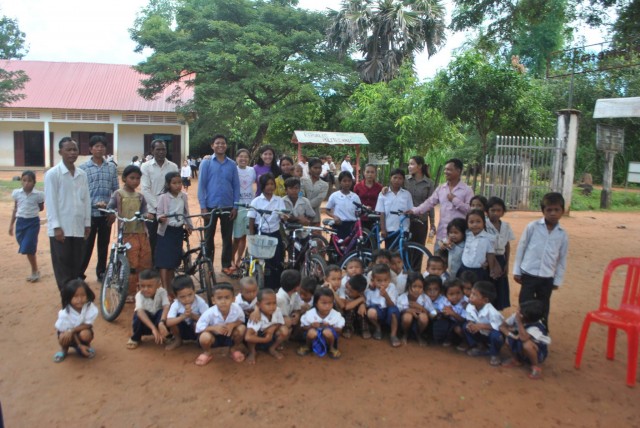
Gabriella Hunt uses cycling in her volunteer program to raise awareness of health and wellbeing. Image supplied by Gabriella Hunt
“I set out to help those people in dire need, little did I know that I probably have done more harm than good.”
Iresha de Silva was no different from any other 18-year-old school leavers, determined and well-intentioned, in 2011 she wanted to make a difference in the world before she goes to university.
What sets her apart from other young girls is what she has experienced and encountered that winter almost 4 years ago.
She spent the most heart-wrenching two weeks of her life after she arrived in Jaffna, the northern part of Sri Lanka where the war was at its worst.
During such a short period of time, stories were told, laughter was shared and a deep bond was quickly formed between her and those children who had lost their parents during the war.
“I really enjoyed my time these helping, teaching and simply being with those kids and found the experience truly rewarding until…”
On the day of Iresha’s departure, as many children running after her to say good-bye with hand-made portraits of her and drawings of Australian flag, she could not help wondering, “was I really doing any good?” and more importantly, “was I doing any harm?”
“I will never forget that day, hands waving, tears shedding, I know I wanted to give to them so much but slowly I realise, emotionally, I took so much from them.
“The question I was asked the most was ‘Iresha, when can I see you again?’.”
Only she knew that they probably wouldn’t, ever again…
Motivations for volunteering
Sadly, Iresha was not the only one who held these heartfelt feelings of unspeakable sadness.
Thousands of school leavers and gap-year takers involve in such projects where volunteering and travel (voluntourism) is combined.
David Clemmons, founder of VolunTourism.Org said “Voluntourism” has emerged to be a big industry these days worth up to $2.6 billion worldwide, with well-meaning young people like Iresha paying thousands of dollars to spend a short time working towards a cause in another country.
The last decade has also seen a surge in the tour companies offering voluntourism opportunities in a wide range of destinations, catering to all levels of commitment.
It seems like a good cause for people to dedicate their hard-earned holiday to give back to those living in precarious conditions and often worse-off than themselves.
“People are often drawn to the notion that they can ‘do good’ while enjoying travelling,” Mr Clemmons said. “Yet the reality is a lot more nuanced.”
What could possibly be wrong with helping the less fortunate? How can we ensure the intention to do good while engaging in leisure always leads to a positive outcome?
Doing more harm than good ?
Voluntourism almost always involves a group of idealistic and privileged travellers who have vastly different socio-economic statuses from those they serve.
Iresha said her peers and herself have some basic understanding of the poverty and the presumed neediness of the community, and for the purpose of volunteering that seems to be enough.
“I now realise that besides having basic characteristics such as compassion, kindness and patience, having some understanding of food, culture, language and domestic affairs is also very essential.
“But sometimes I felt although I was so keen to share and care, subconsciously I was probably trying to alleviate my first-world guilt coming from a rich country like Australia. It seems that even the best intention could end up failing miserably.”
Economic questions aside, serious concerns about the impacts on the emotional and psychological health of young children of short-term voluntourism projects arise.
Mr Clemmons said the nature of the short term voluntourism schemes — constantly changing caregivers — leads to unstable attachments and losses which leaves young children very confused and vulnerable and puts them at greatly increased risk for psychosocial problems that could affect their long-term well-being.
“In those children’s eyes, volunteers are white, mostly young, female students who enter their lives in order to distribute things and spend time with them,” he said.
“The children normally develop an extremely positive image of the volunteers and the ‘oh-so-wonderful western world’.
“Children in the orphanage frequently drew flags of the volunteers’ countries, portraying nice places with good-hearted people, car and airplanes.”
What about the children they leave behind?
The sadness of parting with the children is felt everywhere in the world and the negative impacts volunteers brought to children do not just stop at the emotional level. It goes to a much deeper level where the children’s worldview and their perception of social structure is misguided, or even worse, distorted.
Gabriella Hunt, a young Australian business professional, left her comfortable corporate job, gathered an abundant supply of stationery items and went to Jinja, Uganda in July 2014 to help rural Ugandan communities with their financial literary training.
Just like anyone, Gabriella expected children would definitely enjoy the presence of volunteers. Indeed, they did, they become very excited when new volunteers arrive.
“It puts a smile on their faces and they enjoy playing with new people and attention,” Gabriella said.
“After all, who would not be excited when knowing that sweets, stationery for school, clothing and temporary playmates are on their way?”
Through engaging with volunteers, children learn more about their home countries and realise, however blurred it is in their minds, the concept of “help-givers” and “the needy”.
Children can easily be entertained and satisfied with material things for just a couple of weeks. However, unaware of the widening gap between the developing and developed, such engagement does not contribute to them gaining an understanding of the structural causes of poverty they are in now.
Have to “shell out” to serve
When asked the question: should people pay to participate in the voluntourism programs abroad? Iresha and Gabriella seem to have opposing views.
“No, time is a very valuable aspect in our lives. Giving up our time to help others is enough,” Iresha said.
But Gabriella said the fee is justifiable because there are a lot of benefits you receive from the organisation you work with including orientation, language and technical training.
“Money contributed by the volunteers goes a long way in the organisation,” Gabriella said. “It also contributes to build projects to help disadvantaged communities.”
Popular travel agencies in Australia like STA Travel and Flight Centre also commented that although a certain amount of fee is charged, it is still cheaper to travel to a foreign country with an organisation that handles most of the details than it would be if you tried to do it on your own.
Anna Beech, a travel consultant from STS Travel, said voluntourism programs is a valuable training ground for a wealth of personal skills.
“Participants get training and hands-on experience in communication, business planning and entrepreneurship development,” Ms Beech said.
Vision for voluntourism

Children from disadvantaged communities in China are given the opportunities of education at “Hope School”. Image supplied by Project HOPE China
Granted, there is no easy decision when attempting to weigh up how much to pay to volunteer, how to volunteer, where to volunteer, or whether to volunteer at all.
It seems that voluntourism will remain a controversial industry for some time, but that should not compromise your decision to do something for the greater good.
Mr Clemmons said voluntourism isn’t the only option for people who want to do good in the world and shared his advice for prospective volunteers who genuinely wish to reach out and help.
“Make sure you take up proper training before your go abroad and most importantly don’t overlook those equally rewarding volunteering opportunities available right in your communities such as locally run animal shelters and medical clinics.”
Aily Ren, 28, a public accountant who went to Tibet in an effort to help poor children in a Chinese government-funded “Hope School”, said kids generally welcome people who come to visit and show interests in their lives.
“We should work to provide what the community’s wants and needs instead of our own as travellers, and aim to be sustainable.
“The bond created will never be forgotten, short or long.”
*Iresha and Gabriella’s names have been changed to protect their privacy.


